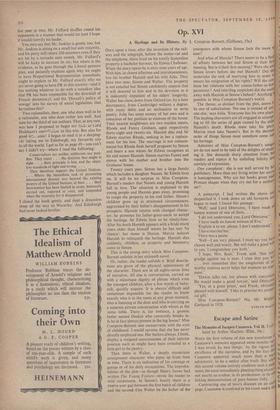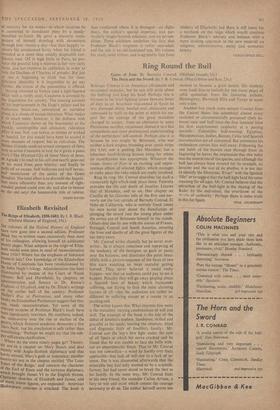Escape and Satire
WHEN the first volume of this new translation 01 If Casanova's memoirs appeared some months aej I was struck by two things : by the vigour at' excellence of the narrative, and by the fact that' Casanova appeared, much more than a me, adventurer, to be a seeker after truth. But whsle e this second volume entirely confirms such a jag' ment, the most immediately pleasing thing about not nearly so evident in its predecessor, is its rol licking demonstration of pure human folly. , Contracting one of love's diseases on an ear') page, Casanova is confined to his room and a
of mercury for six weeks—in which situation he is converted to inordinate piety by a mealy- mouthed ex-Jesuit. He gives a masterly comic Picture of himself drooling with devoutness through four masses a day—but then happily re- covers his accustomed levity when his friend is revealed as a more than usually, .despicable con- fidence man. Off in high fettle to Paris, he pro- cures the grateful king a mistress in her very early teens, and has recourse to cabbalism in order to cure the Duchess of Chartres of pimples. But just as one is beginning to think that for sheer delicious absurdity it is impossible to go any further, the cream of the pantomime is offered.
Having returned to Venice (and a light-hearted affair with a randy nun), Casanova is arrested by the Inquisition for sorcery. The ensuing account of his imprisonment in the Doge's palace and his audacious break-out, considered as narrative alone, is a classic of escape literature. What makes it so much more, however, is the deftness with Which Casanova shoWs up the Inquisition as the shoddy, contemptible and ultimately ridiculous affair it was. Not, you notice, as sinister or wicked or hateful, for this would have been to accord it some measure of respect; but as ridiculous. The Messer-Grande sends an armed company of forty men to arrest Casanova in bed; he is given a pious Work ('The Mystical City of Sister Mary of Jesus, Of Agrada') to read in his cell and nearly goes out of his mind from pure hilarity; and finally he pulls off an escape, half ludicrous and half heroic, and reminiscent of the antics of the Great Houdini. The total effect is to discredit the Inquisi- tion more efficiently than any amount of right- minded protest could ever do, and also to bestow on the old satyr the honourable title of satirist.
SIMON RAVEN











































 Previous page
Previous page